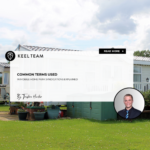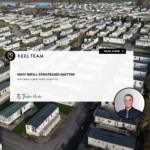Mobile Home Park Investing: How Lot Rent Impacts Your Valuation
-
 Tristan Hunter - Investor Relations
Tristan Hunter - Investor Relations

Mobile home park investing can offer a unique opportunity to generate steady cash flow while providing affordable housing. One of the most important factors influencing a mobile home park’s value is lot rent. Even small adjustments in lot rent can significantly affect the overall valuation of a property.
For investors, knowing how to strategically approach lot rent increases can help maximize return potential while maintaining tenant satisfaction. This article breaks down the role of lot rent in mobile home park investing, how increases impact valuations, and why investors should prioritize stable, long-term revenue.
The Role of Lot Rent in Mobile Home Park Investing
What Is Lot Rent?
Lot rent is the monthly fee that residents pay to lease a plot of land in a mobile home park. Most tenants own their homes but rent the land, which typically includes access to utilities, infrastructure maintenance, and shared amenities.
For mobile home park owners, lot rent serves as the primary revenue source. Unlike rental income from park-owned homes, which involves additional maintenance and management responsibilities, lot rent generally offers a more predictable cash flow.
Download our FREE eBook on the Top 20 things to know BEFORE investing in mobile home parks!
How Lot Rent Increases Affect Net Operating Income (NOI)
A mobile home park’s valuation is largely based on its net operating income (NOI)—the total income generated after operating expenses. Since lot rent makes up the majority of a mobile home park’s revenue, any increase in rent directly raises NOI.
For example, let’s say a mobile home park has 100 occupied lots, each rented at $300 per month. Increasing rent by $25 per month generates an additional $2,500 in monthly income or $30,000 per year. At a 7% cap rate, this increase in NOI could boost the valuation by approximately $428,571. This demonstrates why even small rent increases can create significant value over time.
Balancing Lot Rent Increases with Tenant Retention
While raising lot rent can increase a mobile home park’s valuation, sudden or steep increases may lead to tenant dissatisfaction. Many mobile home park residents live on fixed incomes, and unexpected increases could result in financial strain or higher vacancy rates.
Strategies for Managing Rent Increases Responsibly
Investors can take a strategic approach to rent increases to balance profitability with tenant retention:
- Implement Incremental Adjustments – Small, regular rent increases tend to be more manageable for residents than infrequent but steep hikes.
- Provide Transparency – Clearly communicate why rent is increasing, such as rising utility costs, maintenance expenses, or infrastructure improvements.
- Offer Visible Upgrades – Enhancing landscaping, improving roads, or adding amenities can justify rent adjustments and increase overall tenant satisfaction.
By taking a tenant-conscious approach, investors can sustain long-term cash flow while steadily increasing a mobile home park’s value.
Why Lot Rent Holds Greater Weight in Mobile Home Park Valuations
Lot rent plays a more significant role in determining mobile home park valuations compared to other revenue sources. Investors and appraisers typically prioritize land-based income over income generated from park-owned homes (POHs).
Predictability of Lot Rent Income
Lot rent revenue tends to be more stable than POH income because:
- Residents own their homes, reducing turnover rates.
- Moving a mobile home is expensive, making it unlikely that tenants will relocate frequently.
- Rent payments remain consistent, making income more predictable.
These factors make lot rent the foundation of a mobile home park’s valuation.
The Long-Term Impact of Gradual Rent Adjustments
Unlike short-term rental income fluctuations, rent increases contribute to long-term property appreciation. Even modest adjustments, when executed strategically, can strengthen the asset’s value over time.
Why Park-Owned Home (POH) Income Does Not Drive Valuation
Although income from park-owned homes may improve cash flow, it does not typically add to a mobile home park’s valuation.
Challenges of POH Income
- Higher Management Costs – Park-owned homes require ongoing repairs, maintenance, and tenant management.
- Increased Risk – Vacancies, turnover costs, and unexpected repairs can erode profitability.
- Market Perception – Appraisers and institutional investors often prefer mobile home parks with minimal POHs due to lower operational complexity.
As a result, valuation models often exclude or heavily discount POH income when determining a mobile home park’s worth.

Transitioning Park-Owned Homes to Tenant-Owned Homes (TOHs)
Many mobile home park investors aim to transition POHs into tenant-owned homes (TOHs) to strengthen long-term valuation. By selling homes to tenants and shifting to a lot-rent-only model, owners can reduce overhead while increasing NOI.
Key Benefits of TOH Ownership
- Lower Maintenance Costs – Owners are no longer responsible for home repairs or tenant-related damages.
- Stronger Tenant Retention – Homeowners are less likely to leave, reducing turnover and vacancies.
- Simplified Operations – Managing the land is far easier than maintaining multiple rental units.
Encouraging TOH ownership can enhance cash flow stability and improve the overall valuation of a mobile home park.
How to Strategically Implement Lot Rent Increases
To maximize valuation while maintaining occupancy, mobile home park owners should approach lot rent increases strategically.
1. Research Market Rates
Before adjusting rent, compare lot rents in nearby mobile home parks to ensure your rates remain competitive. Underpriced rents leave money on the table, while excessive increases may push tenants to seek alternatives.
2. Monitor Occupancy Trends
High vacancy rates could indicate that current rent levels are already stretching tenant budgets. In these cases, focusing on retention strategies before increasing rents may be a better approach.
3. Communicate Early and Often
Surprising tenants with sudden rent increases can lead to dissatisfaction. Instead, engage with residents in advance, explaining why adjustments are necessary and highlighting any planned improvements.
4. Pair Increases with Value-Added Enhancements
If tenants see tangible benefits, such as improved infrastructure, upgraded amenities, or better community management, they may be more receptive to rent increases.
Final Thoughts: Lot Rent as a Key Valuation Driver
Lot rent plays a crucial role in mobile home park investing, directly influencing NOI and overall property valuation. Investors who implement well-planned rent adjustments can steadily increase the worth of their mobile home parks without jeopardizing tenant retention.
On the other hand, income from park-owned homes does not typically factor into valuations as strongly. Transitioning to a lot-rent-only model by converting POHs into TOHs can help streamline operations, reduce costs, and ensure long-term growth.
For mobile home park investors, understanding the relationship between lot rent, NOI, and valuation can be a key step in making informed, strategic decisions. By balancing financial goals with tenant needs, investors may position their properties for sustained profitability in this unique real estate sector.
Are you looking for MORE information? Book a 1-on-1 consultation with Andrew Keel to discuss:
- A mobile home park deal review
- Due diligence questions
- How to raise capital from investors
- Mistakes to avoid, and more!
Disclaimer:
The information provided is for informational purposes only and is not investment advice or a guarantee of any kind. We do not guarantee profitability. Make investment decisions based on your research and consult registered financial and legal professionals. We are not registered financial or legal professionals and do not provide personalized investment recommendations.

Tristan Hunter - Investor Relations
View The Previous or Next Post
Subscribe Below 👇





